
Your complimentary articles
You’ve read one of your four complimentary articles for this month.
You can read four articles free per month. To have complete access to the thousands of philosophy articles on this site, please
Films
Good Will Hunting
Michael J. Ferreira takes apart a controversial claim about self-education.
In the 1997 movie Good Will Hunting, Matt Damon plays the title role of Will Hunting, an undiscovered mathematical genius working as a janitor at MIT. In the movie, Hunting famously drops this hard-hitting zinger on a pompous Harvard graduate student in a bar:
“See, the sad thing about a guy like you is in fifty years you’re gonna start doin’ some thinkin’ on your own and you’re gonna come up with the fact that… you dropped a hundred and fifty grand on a ?#@! education you coulda’ got for a dollar fifty in late charges at the public library.”
For many folks it was a gratifying cinematic moment. But there’s something that makes me uncomfortable in Will’s cavalier suggestion that formal education is not worth its weight in cash. It’s difficult to put a finger on the worry, but here’s a first pass: I’m suspicious of the suggestion that anyone can learn as much on their own as they can in a university environment.
Assuming that Will isn’t just picking a fight with the grad student, but actually means what he says, we can attempt to draw out what is wrong with his cutting quip. In fact, it provides a good access point for thinking about a constellation of interesting issues around teaching and learning in the information age.
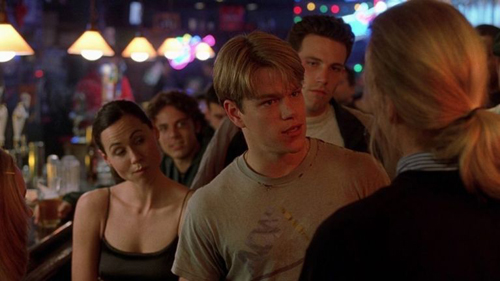
Will’s original bar argument
The Good Will Hunting Fallacy
Let’s call the disquieting idea that I’m stalking here the ‘Good Will Hunting Fallacy’:
Given sufficient time, sufficient access to information, and a sufficiently well-developed capacity to read, the average learner can independently achieve an education equivalent in content and quality to a formal university education.
A fallacy is an error in logic. It’s a mistake in reasoning. So where’s the mistake here?
To tease it out, I think it’s fair to understand Will as claiming that a formal university education is equivalent to an informal self-guided education when measured in content and quality or in knowledge gained. It’s not that Will necessarily assumes informal and formal education to be equivalent on all fronts. He might allow that the economic benefits of degree possession may outpace those begotten by uncertified self-learning. So the Good Will Hunting Fallacy is specifically about the nature of learning and the quality of knowledge acquired informally versus formally, not about the economic contingencies experienced by degree-possessors as compared to the degreeless. In purely qualitative terms, might an informal, self-guided education measure up to a formal university education?
Will’s assertion that it certainly would essentially revolves around an implicit thought experiment. He asks us to imagine a learner who has sufficient time and access to information through the public library, and thereby gains all the knowledge his or her formally educated counterpart does. The strength of Will’s case thus depends on how natural or intuitive this imaginary informal learner seems. Unfortunately, despite some superficial plausibility, Will’s solo scholar makes for a dubious model, for:
(1) Will’s case apparently relies on an ideal learner, who may very well be modeled after Will himself. But Will is a genius.
(2) Will’s case stipulates a problematic definition of ‘education’ which arbitrarily prioritizes propositional knowledge over procedural knowledge.
(3) Will’s case ignores the social dynamics underwriting education and learning.
Let’s take a closer look at how these points subvert Will’s argument.
The Ideal Learner
At various points in Good Will Hunting, we learn that Will whiles away his free time reading Immanuel Kant and John Locke, drinking coffee and beer, and thinking about seemingly unsolvable problems in mathematics – one of which he goes on to solve later in the movie, to his life-transforming acclaim. To be sure, Will is a fascinating character, and fits the mold of an ideal learner very well. Maybe too well. Probably any teacher will tell you that both Will and the idealized learner in his thought experiment are extraordinary idealizations.
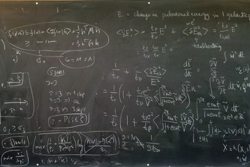
Math from the film. Easy to understand with a couple of library books?
Arguing from experience can be perilous, but here goes. In fifteen-odd years of teaching, I’ve never had a student anywhere near Will in scholarly capabilities. This is not so surprising in itself, but it does underscore the fact that nearly all learners are average learners. I’ve had loads of opportunities to subject average learners to the mind-scorching prose of Kant. Abilities surely vary; but no one usually picks up Kant and smoothly consumes his paragraph-long sentences, breezily absorbing a tight and thorough grasp of Kantian imperatives or Kantian conceptual categories along the way.
This is not to say that Will Hunting is an impossible character. Perhaps there are actual geniuses in the non-fictional world who can independently tackle Kant, cover-to-cover, and understand him after relatively light readings. None of that would help Will’s case, though. For Will’s claim of formal/informal education equivalence to be right, it would have to be true that average learners could assimilate dense, complex, and highly specialized academic content independently, under reasonable time constraints. But it would surely be unreasonable, even naïve, to expect the average learner to grapple with and conquer the arts and sciences on their own.
One apparently crucial missing element for the average non-genius is access to dialogue with a subject matter expert. In a university, this access typically comes with a broad network of academic and intellectual support, including tutoring, professional library support, peer support, academic counseling, and so on. These kinds of support structures are the ubiquitous elements of traditional formal degree programs. They are not restricted to formal degree programs, but they are not common or easily accessible outside of academia. Indeed, in the movie Will himself eventually receives the invaluable support of Robin Williams, playing therapist Dr Sean Maguire, as part of his journey of intellectual and emotional development.
Will must not mean us to assume that his imaginary learner has access to all this. If he did, it would no longer be clear at all that he’s envisioning the kind of self-guided informal education he seems to be talking about. So we apparently have a dilemma for Will. On one hand, if he is expecting us to assume that the learner in his thought experiment is like him – a polymathic genius with an innate ability to comprehend any subject matter – then next to no one is like Will. But on the other hand, if Will is expecting us to assume that his imaginary learner is average, it’s unreasonable to assume that this learner could independently achieve a grasp of many of the conceptual complexities one grapples with in formal higher learning by reading in a library.
Knowing-That vs Knowing-How
It is uncontroversial, if underappreciated, that a comparatively large part of formal schooling involves learning how to engage in intellectual activities rather than simply learning information. Curricula are never confined to simply conveying facts (and facts about fictions) to students. Students do learn that Austin is the capital of Texas, that the Thirteen Colonies declared independence from Great Britain in 1776, that (spoiler alert) Juliet tragically commits suicide, and so on. But rather than just learning that this or that is the case, students also engage daily in process learning. We do not just learn the sad narrative of Romeo and Juliet, we learn to read, including learning strategies for effective reading and language consumption. Neither do we just memorize the rules of grammar, we learn to write. We learn how best to communicate in writing for a variety of purposes. Beyond learning facts about the world and facts about fictions, we learn how to analyze information and how to synthesize it. We learn how to ask and sharpen questions. We learn how to use imagination to evaluate possibilities. We learn how to reason analogically. The summation of all these capabilities, roughly put, amounts to learning how to learn.
Crucially, we learn all this great diversity of procedural knowledge – as contrasted with propositional knowledge – by emulating teachers and peers. We gain intellectual know-how by assimilating the practices we are introduced to by instructors and other learners, and then by pushing past the limits of our own capacities at any given time. At least this is how things seem generally to proceed for the average learner. However, none of this story of procedural knowledge is any part of Will’s story about knowledge accrual.
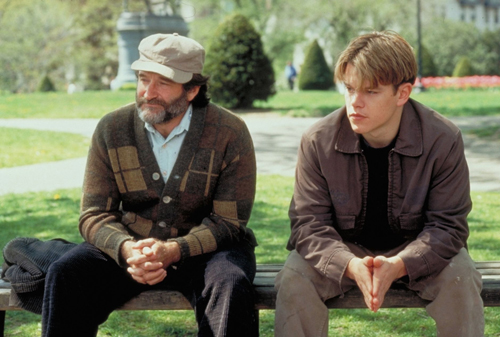
Will with his mentor
Taking him at his word, Will seems to think that a capacity to read and remember is in principle sufficient for the accumulation of all the knowledge one could otherwise gain from a university education. By implication, he either excludes the crucial procedural learning component we just looked at, or he thinks his library-learning model somehow incorporates it. But he can’t really have either of those without running headlong into another fallacy: It’s implausible that the necessary know-how could be gained entirely independently by the average learner. Rather, intellectual know-how in all forms, from speaking to reading to writing to reasoning, is unlocked by sustained and repeated interactions with other minds. The average learner, unlike the Will Huntings of the world, requires active coaching and relentless interactive practice to get there.
Will might reply that in primary and secondary school we get all the scaffolding we need in order to learn: it’s the college stuff that we may as well get on our own. But now he’ll have to quell the worry raised earlier: most learners are nowhere near the ideal level his argument relies on, even after graduating from high school. Anyway, it seems straightforwardly false to claim that learning how to do complex cognitive tasks with complex sets of information ends with secondary schooling. Intellectual skills continue to grow and sharpen through university, and on into the more arcane halls of graduate and faculty-level academia.
So, unfortunately for Will, it now looks like he’s simply assuming what he set out to establish: that an informal, self-guided program of education could be equivalent in content and quality to a formal university education. If he can’t account for the large swaths of our learning that result in intellectual know-how, then his argument apparently devolves into circular reasoning.
The Dialectical Nature of Learning
I’ve pointed out the substantive role other people play in our learning. The kernel of truth in the stereotype of the diligent student squirrelled away in the library achieving understanding by the light of their own mind is just the kind of partial truth that make stereotypes sometimes useful and sometimes harmful. They capture part, but not the whole. Family members, teachers, friends and peers at all levels of education are facilitators of both propositional knowledge and procedural knowledge.
In particular, we give short shrift to the teachers and professors of the world when we portray them as walking encyclopedias, as if they were mere repositories of facts. School teachers and professors don’t exist just to convey propositional knowledge to us. If that were the case, Will would be right, and we wouldn’t need them. A university-age individual certainly doesn’t need an expert to tell them that Andromeda is the nearest large galaxy to our own, or that Wuthering Heights was written by Emily Brontë. Those facts could be easily learned by a trip to Will’s library, or these days, via any smartphone. But the same individual probably does need someone to help them learn how to read a map, how to identify a theme in a literary work, and how to test a hypothesis. Upon reaching university, they will similarly require some help grasping Kant’s conceptual categories, or Darwin’s theory of natural selection, or the complex historical factors explaining the build up to the American Civil War. Building the conceptual bridges necessary to grasp these kinds of sweeping concepts and theories is an intellectual skill par excellence. Good teachers and university professors are expert facilitators of just this kind of mind expansion. Put another way, teachers and professors are arbiters of intellectual know-how. They have the subject matter expertise, and they repeatedly get to experiment with methods for training students in the intellectual skills needed for their discipline. They draw on their accumulated expertise, teaching experience, and concrete tools custom-developed for the classroom to bring their students to the point where they can have an enlightened relationship with the discipline under study.
It’s certainly true that undergraduates, graduate students, and professors, spend hours working alone, independently wrestling with and pushing against the current boundaries of knowledge. But that is merely half the story, at most. The other half finds both learner and teacher among other learners and teachers within the seminar room, giving talks to and fielding questions from groups, interacting with a dissertation advisor and/or committee, and so on. The seminar room, in particular, is a place for floating ideas and subjecting them to the unfiltered criticism of peers and intellectual superiors. All of these socially-implemented mechanisms serve as important checks and balances to the individual learner.
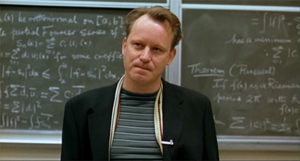
You’re going to need one of these
While the Good Will Hunting Fallacy targets higher-education specifically, it bears emphasizing that the intellectual training that takes place in the seminar room doesn’t seem qualitatively different from the learning that happens much earlier in life. In the pre-school room, young learners watch the behavior, assertions, and conjectures of their peers being checked and balanced by the teacher and each other. Even before pre-school it starts at home, where emerging minds create and test simple hypotheses about relationships and roles, and about the physical space they’re finding themselves in. No part of this seems to be a robustly solitary or independent process.
My point is not to try to somehow rule out independent learning. Of course self-teaching occurs. But it’s easy to ignore or downplay the role competent instruction plays in our learning. Good teachers, at all levels, bring with them methods, tools, scaffolding, and aids that trigger, enable, and support much of whatever conceptual bootstrapping we manage to accomplish ourselves.
It bears emphasising, too, that the learning model imagined by Will is vastly different from most mainstream models of formal education currently being implemented. A crucial difference is evident in the dearth of expertise in procedural knowledge on Will’s model. Taking both the lack of expertise and the lack of sustained and challenging dialogue into account, the chances that self-guided, independent learning could converge in results with the formal resource-rich learning in college seem vanishingly small.
These considerations weigh in favor of rejecting Will’s idea that independent, informal learning is essentially equivalent to dialectical (dialogueing), formal learning. On balance, our own limitations and the social realities of learning combine naturally in ways that simply don’t justify Will’s disdainful repudiation of formal higher education.
Any Further Lessons?
At least one other serious concern merits contemplation:
(4) Will’s case ignores the vetting and sourcing of information.
Will seems to assume that the average learner is more or less capable of discriminating legitimate information from misinformation and disinformation among the public library’s offerings. There’s no real need, on Will’s view, for the intervention of experts, protocols, mechanisms and infrastructure to support the learner through the process of information evaluation. There’s no need, that is, for an interwoven system of means to ensure fidelity in the production, transmission, and storage of information.
To promote self-guided learning over formal, guided education, is to reject the role that experts play in shepherding information. But surely this role is as important for teachers as facilitating learning. So the Good Will Hunting Fallacy invites us to disregard higher education’s staff as facilitators of skills and propositional knowledge and then also reject them in their role as stewards of hard-earned, vetted information.
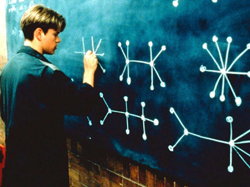
Janitor solves famous math problem
Admittedly, the lack of safeguards around the independent learner may appear slightly more palatable in Will’s pre-internet vision of the average learner absorbing knowledge under the trustworthy lights of the public library. The library, after all, seems like a pretty safe place to get one’s information. And libraries have librarians to help you sort through the chaff, if necessary. But Will’s public library has now been exchanged for a transcendent, intangible, never-ending repository of content that is not sorted into legitimate and illegitimate content. Here I think we see Will’s fallacy exposed as a bold-faced declaration of intellectual hubris. The Fallacy articulates the self-confidence, mostly unwarranted in the average learner, which might lead someone to shun and undermine experts, while at once arbitrarily elevating themselves (and their colleagues) to levels of authority. But it would surely be irresponsible to expect average learners to become adept, all on their own, at discriminating among the gigabytes of information thrown at them every day.
So, albeit unexpectedly, Will’s fallacy raises some of the pressing concerns around information that have been exploding in the media in recent years. What for example should we expect from real-world embracers of the Good Will Hunting Fallacy? Those in the grip of the Fallacy believe, like Will, that they are capable of individually steering themselves through the internet’s labyrinths of conspiracies, disinformation, misinformation, alternative facts, and half-truths. We should probably expect that sometimes they would unwittingly cherry-pick facts, leading them to construct and promote world-views that are out of alignment with reality.
This is in fact what we do see. The hubris that leads people to believe that they are capable and reliable individual arbiters of truth surely aided, for example, the Russian election interference efforts in 2016, a large part of which involved discrediting political candidates by propagating misinformation through social media channels. Other usual suspects come to mind too: People who fervently embrace anti-vaccine misinformation, climate change deniers, flat-earthers, and on and on. Just as if the science in these areas has not already been decided by the experts, the fallacy-embracer finds illegitimate sources and arbitrarily makes them authoritative.
Disinformation, and the branches that sprout from it, pose real dangers. Confirmation bias and wishful thinking are not just traits of those in the grip of the Good Will Hunting Fallacy. Nevertheless, Fallacy-embracers strike me as more vulnerable, for, with Will’s genius out of the picture, an unwarranted self-confidence in one’s own ability to vet information and sources surely cripples one’s capacity to evaluate those sources and content.
Conclusion
Will Hunting’s suggestion that the content and quality of a formal university education can be equivalent to the content and quality of an informal self-guided education, has some emotional appeal. The seductiveness of the idea stems from its simplicity, its blind optimism, and its rebelliousness. But I’ve argued that the idea amounts to a fallacy of idealization which I’ve called the Good Will Hunting Fallacy.
I have to admit that there is a historically contingent aspect to my argument. Who knows, after all, what independent learning will look like ten, twenty, or fifty years from now? The landscape of teaching and learning is changing rapidly, and it’s impossible to predict all of the coming opportunities for improved forms of solo learning. Nevertheless, however learning may evolve, I doubt the average learner will ever be able to independently avail herself of dialogue with subject matter experts, at least to the extent needed to maximize her intellectual skill set.
I also admit that it’s possible that Will didn’t really intend to insinuate that a self-guided library education was equivalent to a formal university education. After all, he must have realized that the exquisite, esoteric mathematical proofs that he completed as a janitor-on-probation were predicated upon the work of prior experts and geniuses, all of whom had their work checked, balanced, and chiseled by academic colleagues, friends, enemies, and students. Will must have understood on some level that there are upward limits on the kind of education you might give yourself at the library.
© Dr Michael J. Ferreira 2022
Michael Ferreira is co-founder of Everywhere Philosophy, adjunct professor at the Community College of Vermont, and an Information Operations officer in the Vermont Army National Guard.









